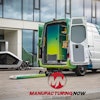I’m fascinated by the mystery surrounding “getting organized.” The billions of dollars spent on a vast array of tools and information for managing ourselves and our stuff seem to indicate the widespread belief in a get-it-together Holy Grail somewhere. And the sirens keep beckoning with a continual parade of techno-magic gizmos that will pull it all together.
But the ultimate formula remains elusive. I’m still asked by some of the brightest folks around, “What’s the best way to get organized? How do I create the best system for myself? How do I know what to do with all this stuff?” Lo, they seek but have not found.
Rejoice, for I have decided to reveal the (organizing) secret of the ages right here on Manufacturing.net! Rest your weary mind — the time has come to reveal the answer to the meaning of (organized) life.
Ready? Here it is: things need to go where they need to go.
Ah, Grasshopper, you seem dazed (or simply unimpressed) with this astounding truth. Let me explain. When something is “organized,” it simply means that it’s where it needs to be. Where is that? In a place that reflects what the thing specifically means to you.
You are disorganized if you need something in a place you don’t have it or if you have something in a place you don’t need it.
If you have a phone and time to spend, you need to have your complete list of phone calls to make. Otherwise, you don’t have the information you need — in the format you need to remind you of what you need to be reminded of — when you can do it. If you are trying to prepare a lovely five-course dinner but the kitchen counters are still full of last night’s dishes, you’re not organized. There’s stuff in the way that you don’t need. In either case, you’re not organized — at least not as much as you could be.
Try this: reach into your purse or wallet and see if there’s something that doesn’t belong there permanently — besides money — that has been there longer than a few hours. Almost everyone has at least one thing in that category — a receipt, a business card, a scrap of paper with scribbled notes, an old parking ticket. If the item has no further usefulness, it is trash, but it’s not in the trash. If it is something you need to store somewhere else — if it’s reference — it’s not easy to find with your other reference materials. If it’s something you need to do something about, it’s not in a place to remind you to do it. There is a mismatch between what the thing is and where it is.
Lots of folks contend that “stacks” are what they want and that they’re the best way to be organized. But most piles people have around them have a blended mixture of stuff to read (when they have time to read), stuff to store away that they want access to (reference), stuff to throw away (trash) and stuff they still need to decide what they are going to do about (in-basket). The background stress from those constipated stacks generates a mental callous — we stop noticing the piles, at least enough to really do something about them.
So, how does the meaning of something translate into organization? Pick up anything around you that you’re wondering what to do with and ask yourself which of these descriptions is the best fit:
- I don’t need or want it = trash
- I still need to decide what this means to me = in-basket item
- I might need to know this information = reference
- I use it = equipment and supplies
- I like to see it = decoration
- When I could possibly move on it, I want to see the action as an option = next action reminder, reviewed when and where it could be done
- I need to be reminded of this short-term outcome I’ve committed to = project list item, reviewed weekly
- I need to have this when I focus on a project = support material
- I might want to commit to this at any time in the future = someday/maybe list item
- I might want to commit to this on or after a specific time in the future = calendared or “tickled” item incubated for review on a specific future date
- I want to achieve this “bigger” outcome = goals, objectives, visions that you review on some longer interval
- It’s something someone else is doing that I care about = item on waiting-for list, reviewed at least weekly
- I need to consider it when I do certain recurring activities = item on a checklist
You can organize anything in your work or personal life by asking yourself whether its meaning matches its location. Organizing tools should not be so mysterious — they are merely to support these various functions. A PDA won’t tell you if something is a call that belongs on your calls list, but once you decide it’s a call, the PDA can be a fine place to manage your calls list.
This is simple common sense. So why do so many people feel like they need to be more organized? Because most avoid deciding what so many things actually mean to them, which makes it impossible to know what to do with them. And what’s even thornier is that even if they “get organized” according to these simple criteria, it is highly likely that they can become disorganized rapidly. Over time (and often not that much time), things change in meaning. The magazine is no longer the current issue, the project is no longer something we’re committing to action or the good idea isn’t so good any more.
So even if we get our ducks in a row, they wander on their own accord. Being organized is a dynamic process, demanding consistent reevaluation, rethinking and renegotiating the relevance of things in our physical and psychological environment.
I don’t tell people how to get organized. I only assist them to connect what things mean with where they are.
You can find out more about David Allen and GTD at www.davidco.com.
The David Allen Company is a professional training, coaching and management consulting organization, based in Ojai, Calif. Its purpose is to enhance performance and improve the quality of life by providing the world’s best information, education and products in the fields of personal productivity and work/life balance.






















